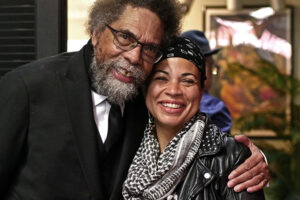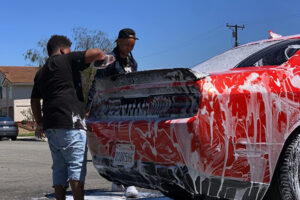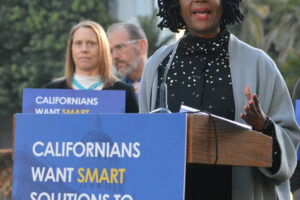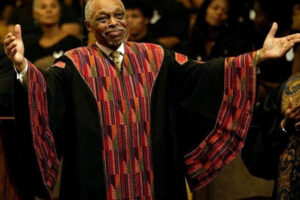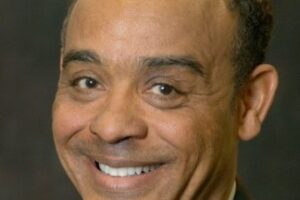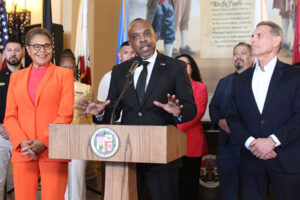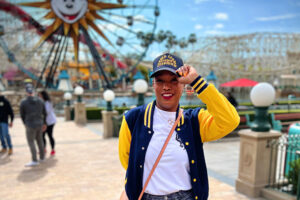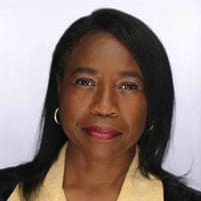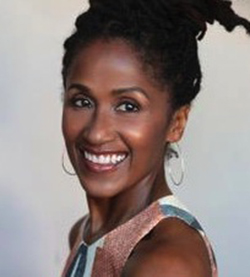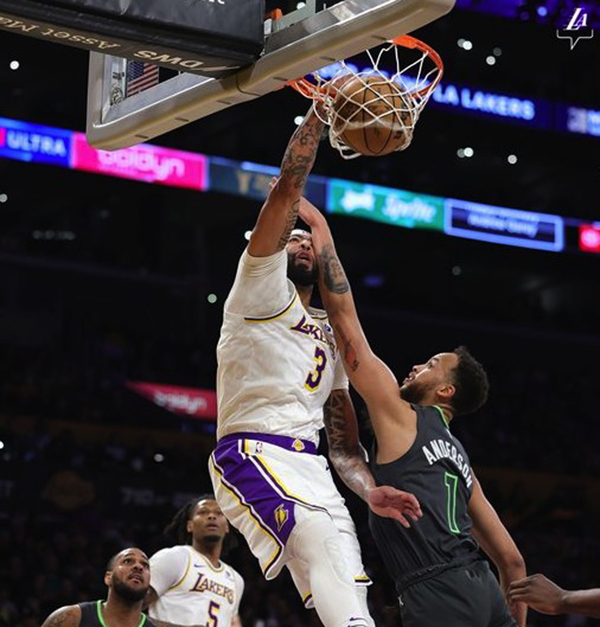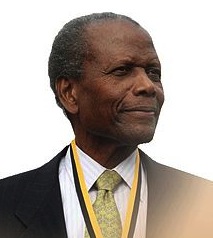By Darlene Donloe
Contributing Writer
In 1993, a group of women who met at a California Arts Council Touring Roster conference decided to get together and change the impact of women in theater in Los Angeles.
The result of that meeting was the launch of the Los Angeles Women’s Theatre Festival.
Adilah Barnes was one of those women and today she continues to be at the helm of the organization whose mission is to raise the voices of women in the theater community so that they can be “heard and honored.”
For 29 years, Barnes has been the face of the Los Angeles Women’s Theatre Festival. In those three decades, her enthusiasm, excitement and dedication to the arts and the progress of women in the field, haven’t waned. She’s just as fired-up about the Los Angeles Women’s Theatre Festival’s possibilities as she was when it first started.
Barnes, who is also the organization’s executive director, started out her theatrical career in Oroville, California, where she studied theater with an independent major in Black drama at UC Santa Cruz.
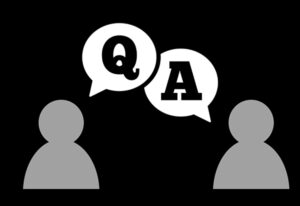
She moved to Los Angeles to immerse herself in the theatrical community as a working actor.
Barnes prefers to be called an actor rather than an actress because “the actor has more weight than an actress. It’s equal footing. They don’t call a female doctor a doctress, they call her a doctor.”
In addition to her role with the Los Angeles Women’s Theatre Festival, Barnes, a mother of one, hosts a writer’s retreat for women in Sharpsburg, Georgia, called The Writer’s Well. Founded in 2007, the organization is designed for female writers who want to activate their literary voices.
In 2008, she published her book, “On My Own Terms: One Actor’s Journey.”
A writer, acting instructor, producer, internet talk show host, lecturer, acting coach,and veteran actor, some of Barnes’ credits include the television show “4400,” where she has a recurring role. She also appeared in the films “Erin Brockovich” and “Iron-Jawed Angels,” and in the television shows “The Middle,” “NCIS,” “Roseanne” and “Little John” on HBO.
On stage she played the role of Mama in a production of “A Raisin in the Sun” at her alma mater and is proud of her solo show, “I Am That I Am: WOMAN, Black,” where she portrays Sojourner Truth, Lorraine Hansberry, Harriet Tubman, Zora Neale Hurston, Mary McLeod Bethune, Angela Davis and Maya Angelou.
“I wanted to do a show that celebrated Black women,” Barnes said. “This is my contribution to keeping Black history alive.”
In March, the Los Angeles Women’s Theatre Festival presented its 29th annual festival with the theme, Beyond Boundaries. The event honored Olympia Dukakis (posthumously), Chita Rivera, Iona Morris, Terrie Silverman and Kristina Wong.
This October, through a grant from Culver City, the Los Angeles Women’s Theatre Festival will present the program, “Senior Stories: A Jubilee Celebration,” a six-week workshop for seniors interested in telling their stories.
On June 18, the Los Angeles Women’s Theatre Festival will present the solo new work series, “Hot Off The Press: Fathers, Friends, and Freedom,” in celebration of the Juneteenth and Father’s Day weekends.
“Hot Off the Press” is a program of five new solo writings presented by scribes in staged readings. The virtual, free show will be presented at 6 p.m. June 18. Order tickets at https://lawtf.org .
I recently caught up with Barnes to discuss her career, the upcoming event, her position as co-founder and executive director, and the future of the Los Angeles Women’s Theatre Festival.
DD: When you were at UC Santa Cruz, was your goal to become a star in either theater, TV or film?
AB: I never thought about being a star. I tell my students stars are in the sky. What’s more important is being a working actor.
DD: You are the co-founder of the Los Angeles Women’s Theatre Festival. Who is the other co-founder?
AB: Actually, there are six others who are also co-founders. They include Miriam Reed, Joyce Guy, Judith Heineman, Nina Kaufman, Helene McCardle and Phylise’ Smith. We all met at a California Arts Council Touring Roster conference. Miriam had a great idea of asking if there are any other solo artists at the conference to meet us in the rear.
We were bombarded with actors, dancers, storytellers, performance artists and performance poets. It was amazing. We looked at each other and knew we were on to something. By the end of the evening, the Los Angeles Women’s Theatre Festival was born.
We formed it in July 1993 and by March of 1994, we presented our first festival. We wanted to make sure we had a platform to produce our own solo works. We wanted a platform for other solo artists to share their voices. Now we’re the oldest solo festival for women in Los Angeles.
DD: Why is there a need for a Los Angeles Women’s Theatre Festival?
AB: There is a need because women’s voices need to be heard, honored and cherished. We collectively, as women, have so many stories to tell.
DD: Why should the Los Angeles Women’s Theatre Festival be important to the public, and why is it important to you?
AB: It’s important to the public because when we present our programming, especially our crown jewel annual festival, audiences can experience different genres, hear different voices, see themselves and be exposed to works that represent stories beyond themselves.
It’s important to me because it means that I have a small part in keeping solo stories alive and well by creating a space where women can, very safely, share their personal stories.
DD: What is considered women’s theater?
AB: From where I stand, it’s theater that, as a focal point, really relates stories that have to do with our gender. It can include others. At the heart, it needs to be about women telling their stories.
DD: What is the state of women’s theater in Los Angeles?
AB: I think it’s very strong. It’s thriving. It’s growing. More and more, women are telling their stories and writing their pieces and creating and directing, producing and being technicians.
DD: Why is there a need to designate something as women’s theater?
AB: The truth is that many people do theater. It’s not designated or designed for the voices of women. That’s our niche. That’s what we do. There are more roles for men. Our contribution is for women to have their voices heard.
DD: What kind of satisfaction do you get knowing what the Los Angeles Women’s Theatre Festival has done for women?
AB: Personally, it makes me feel very proud to be a part of something that has withstood the test of time. I have been a part of keeping their works alive on stage. Knowing that women can feel that their voices are being heard through the Los Angeles Women’s Theatre Festival is really our target market — women.
DD: Do you consider L.A. a theater town?
AB: Yes. I moved here from the Bay Area in 1989. Before moving here, my impression was that it was a town for TV and film but not stage. I didn’t think L.A. could match the Bay Area. I was grossly wrong. This is quite a theater town. There are lots of solo artists here. More artists are taking control of their own careers.
DD: Describe what the theater means to you.
AB: Stage is live. It’s in your face. The audience is a part of you. There are no second takes. If something goes wrong, you have to keep going. You have to be able to sustain yourself on that stage.
DD: I’ve heard some Black female actors say that they will never play a maid or a prostitute. Is there a character you wouldn’t play?
AB: No nudity, but at my age, I don’t think that would be an issue.
“The Q&A” is a new feature of Wave Newspapers asking provocative or engaging questions of some of L.A.’s most popular newsmakers or celebrities.
Darlene Donloe is a freelance reporter for Wave Newspapers who covers South Los Angeles. She can be reached at ddonloe@gmail.com.

